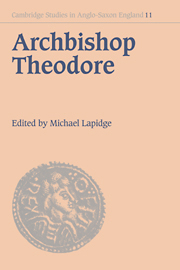Book contents
- Frontmatter
- Contents
- Preface
- List of abbreviations
- 1 The career of Archbishop Theodore
- 2 The Syriac background
- 3 Theodore of Tarsus and the Greek culture of his time
- 4 Rome in the seventh century
- 5 Theodore, the English church and the monothelete controversy
- 6 The importation of Mediterranean manuscripts into Theodore's England
- 7 Theodore and the Latin canon law
- 8 The Penitential of Theodore and the Iudicia Theodori
- 9 Theodore and the Passio S. Anastasii
- 10 Theodore and the Laterculus Malalianus
- 11 Theodore and the liturgy
- 12 Theodore's Bible: the Pentateuch
- 13 Theodore's Bible: the gospels
- 14 Theodore and Anglo-Latin octosyllabic verse
- 15 The Canterbury Bible glosses: facts and problems
- Index
14 - Theodore and Anglo-Latin octosyllabic verse
Published online by Cambridge University Press: 03 May 2010
- Frontmatter
- Contents
- Preface
- List of abbreviations
- 1 The career of Archbishop Theodore
- 2 The Syriac background
- 3 Theodore of Tarsus and the Greek culture of his time
- 4 Rome in the seventh century
- 5 Theodore, the English church and the monothelete controversy
- 6 The importation of Mediterranean manuscripts into Theodore's England
- 7 Theodore and the Latin canon law
- 8 The Penitential of Theodore and the Iudicia Theodori
- 9 Theodore and the Passio S. Anastasii
- 10 Theodore and the Laterculus Malalianus
- 11 Theodore and the liturgy
- 12 Theodore's Bible: the Pentateuch
- 13 Theodore's Bible: the gospels
- 14 Theodore and Anglo-Latin octosyllabic verse
- 15 The Canterbury Bible glosses: facts and problems
- Index
Summary
What is probably the earliest surviving piece of Latin verse written in Anglo-Saxon England (certainly the earliest which is securely datable) is a poem of six lines' length addressed by Archbishop Theodore to his colleague Haeddi, bishop of Winchester:
Te nunc, sancte speculator,
Verbi Dei digne dator,
Hæddi, pie praesul, precor,
Pontificum ditum decor,
Pro me tuo peregrino
Preces funde Theodoro.
There need be no doubt that the Theodore of the poem is Theodore, archbishop of Canterbury (668–90): the poem is transmitted with a copy of Theodore's Iudicia in Cambridge, Corpus Christi College 320 (a St Augustine's, Canterbury, manuscript of late tenth-century date), where it serves as a sort of rubric (p. 71) to various regulations on penitence; and the poet describes himself as a peregrinus, which would be an appropriate description of our archbishop of Canterbury. Haeddi was bishop of Winchester from 676 to 705: the poem was therefore composed between 676 and Theodore's death on 19 September 690.
The most striking feature of this (otherwise perhaps unremarkable) little poem is its rhythm, for it seems to be constructed with attention to the natural stress of Latin words. (All Latin words were naturally stressed on the penultimate syllable, except in the case of polysyllabic words whose penultimate syllable was short, in which case the accent was thrown forward on to the antepenultimate syllable.)
- Type
- Chapter
- Information
- Archbishop TheodoreCommemorative Studies on his Life and Influence, pp. 260 - 280Publisher: Cambridge University PressPrint publication year: 1995
- 6
- Cited by



